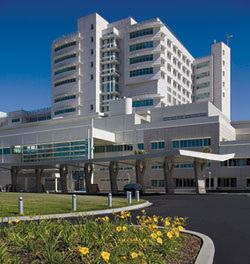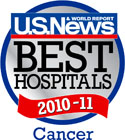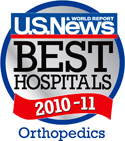
Out of more than 5,000 hospitals nationwide, UC Davis Medical Center was ranked 35th for orthpaedics and 50th for cancer care in this year's U.S. News and World Report survey.
Posted Oct. 13, 2010
UC Davis Medical Center ranks among the top 50 hospitals in America, according to an annual survey published in the August issue of U.S. News and World Report.
Out of more than 5,000 hospitals nationwide, UC Davis Medical Center was ranked 35th for orthopaedics and 50th for cancer.
“We are delighted with this recognition from U.S. News,” said Ann Madden Rice, UC Davis Medical Center CEO. “It is one of several indicators we use to monitor our ongoing efforts to provide excellent patient care and improve health outcomes for our community, the region and beyond.”
Only two other Northern California hospitals ranked in the top 50 for cancer: UC San Francisco Medical Center and Stanford Hospital and Clinics.
UC Davis Cancer Center Director Ralph deVere White said he was gratified that the U.S. News rankings recognized UC Davis’ excellence in cancer research and clinical care.
 “(The U.S. News & World Report survey) is one of several indicators we use to monitor our ongoing efforts to provide excellent patient care and improve health outcomes for our community, the region and beyond.”
“(The U.S. News & World Report survey) is one of several indicators we use to monitor our ongoing efforts to provide excellent patient care and improve health outcomes for our community, the region and beyond.”
— Ann Madden Rice, UC Davis Medical Center CEO
"We are one of only 65 hospitals in the country with a cancer center designated by the National Cancer Institute, and have recently expanded our reach through our Cancer Care Network of community hospitals in Truckee, Pleasanton, Merced and Marysville," he said. "This recognition represents our national standing as a community resource that is doing all it can to better people’s lives through excellent cancer care.”
Only three other Northern California hospitals ranked in the top 50 for orthopaedics: UCSF Medical Center, Stanford Hospital and Clinics and John Muir Medical Center in Walnut Creek.
Paul DiCesare, medical director and chair of orthopaedic surgery at UC Davis, said the recognition highlights efforts toward building a leading orthopaedic department.
“The UC Davis Department of Orthopaedic Surgery is a leader in state-of-the-art orthopaedic surgery, research and education, with a world-renowned level 1 trauma center and a musculoskeletal research center that are among the nation’s most sophisticated and interdisciplinary,” he said. “Our program, encompassing nine subspecialties, a 24-hour level I trauma center and Shriners Hospitals for Children, plus access to the latest clinical research trials, ensures one-stop coverage and the best available care.”
The U.S. News survey also showed that UC Davis Medical Center’s nurse-patient ratio — 2.8 registered nurses per patient bed — was among the highest in the nation. In cancer, only Mayo Clinic had a higher nurse-to-patient ratio, with three nurses per bed. In orthopaedics, only Mayo and Abbot Northwestern Hospital in Minneapolis had higher ratios, both with three nurses per bed.
The Best Hospitals 2010-11 issue ranks medical centers nationwide in 16 specialties, and examines death rates, volume, balance of nurses and patients, reputation and the availability of medical technology, among other measures.
UC Davis Medical Center is a comprehensive academic medical center where clinical practice, teaching and research converge to advance human health. Centers of excellence include the National Cancer Institute-designated UC Davis Cancer Center; the region's only level 1 pediatric and adult trauma centers; the UC Davis MIND Institute, devoted to finding treatments and cures for neurodevelopmental disorders; and the UC Davis Children's Hospital.
The medical center serves a 33-county, 65,000-square-mile area that stretches north to the Oregon border and east to Nevada. It further extends its reach through the award-winning telemedicine program, which gives remote, medically underserved communities throughout California unprecedented access to specialty and subspecialty care.

